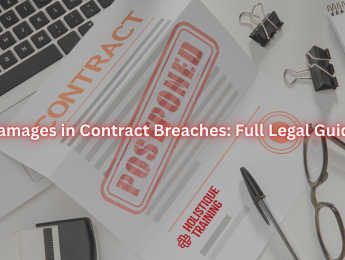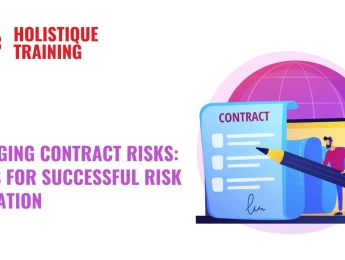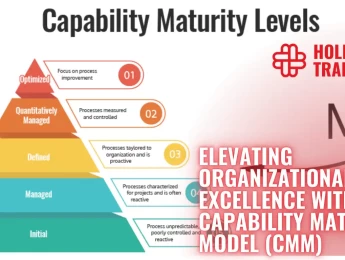- Table of Contents
- Introduction
- What is CIPD?
- What is SHRM?
- Key Differences Between CIPD and SHRM
- Costs and Study Time
- Quick Comparison Table: Cost and Time Commitment
- Global Recognition and Career Growth
- Global Recognition:
- Career Impact:
- Quick Comparison Table: Global Recognition and Career Impact
- Which Certification Should You Choose?
- 1. Career Path and Professional Aspirations:
- 2. Geographic Consideration:
- 3. Time and Cost Considerations:
- 4. Industry Recognition:
- The Bottom Line:
- Conclusion
Introduction
If you're pursuing a career in Human Resources or currently working in the field, professional certification can significantly elevate your credibility, open global opportunities, and fast-track your career. But with multiple options available, two certifications stand out worldwide: CIPD and SHRM.
At first glance, both credentials seem similar—they promise professional recognition, career advancement, and international value. But once you dig deeper, clear differences emerge in their educational approach, geographic influence, cost, time investment, and the type of HR roles they support. While CIPD is rooted in academic rigor and strategic HR thinking with strong ties to the UK and the Middle East, SHRM leans into real-world application, business alignment, and is widely recognized in the U.S. and globally by multinational companies.
In this comprehensive guide, we break down everything you need to know about CIPD and SHRM—including certification levels, learning styles, costs, global recognition, career impact, and which fits best depending on your goals.
What is CIPD?
The Chartered Institute of Personnel and Development (CIPD) is a UK-based professional association dedicated to HR management and development. Founded over 100 years ago, it has built a strong reputation for setting industry standards and offering comprehensive learning pathways for HR and L&D professionals.
CIPD certifications are globally recognized, especially across the UK, Europe, and parts of the Middle East, making them highly attractive for individuals seeking to grow their careers internationally. Whether you're just starting out or looking to climb to senior HR leadership roles, a CIPD qualification can offer structured development that matches your career stage.
CIPD offers different levels of certifications, including:
- Foundation Certificate: Ideal for beginners new to the HR or L&D fields.
- Associate Diploma: Designed for those with some experience who are looking to deepen their knowledge and skills.
- Chartered Member/Fellow: Targeted at seasoned HR professionals who lead strategic initiatives and influence organizational direction.
One of CIPD’s distinctive strengths is its emphasis on strategic thinking and policy-making. Students don’t just learn operational HR tasks; they are trained to design, implement, and evaluate people strategies that drive business success.
In addition to technical expertise, CIPD places a strong focus on evidence-based practice. Candidates are encouraged to back their decisions with research and real-world case studies, helping them build credibility and confidence in high-stakes professional environments.
The academic nature of CIPD programs means you can expect to engage with research papers, critical essays, and practical projects, developing not only HR expertise but also leadership, communication, and strategic planning skills.
Overall, CIPD qualifications are ideal for HR professionals aiming to lead people functions at a high level, make impactful organizational changes, and establish a global HR career.
To know more about CIPD, read: CIPD Overview: Exploring Its Levels and Key Insights
What is SHRM?
The Sustainable Human Resource Management (SHRM) is a prominent U.S.-based professional body that focuses on advancing the HR profession globally. Founded in 1948 and headquartered in Alexandria, Virginia, SHRM has grown to become one of the largest HR membership organizations in the world, with over 300,000 members across more than 165 countries.
Here’s what makes SHRM stand out:
Strong U.S. and Global Presence:
SHRM certifications are especially valuable for HR professionals working within the U.S. or for multinational companies following U.S.-based HR models and legal systems. Its influence is also growing worldwide.
Practical, Application-Based Certifications:
SHRM offers two main certifications:
- SHRM-CP (Certified Professional): For HR practitioners handling daily operations, policy implementation, and employee relations.
- SHRM-SCP (Senior Certified Professional): For senior HR leaders responsible for developing strategies, leading teams, and aligning HR initiatives with business goals.
Focus on Real-World Scenarios:
Unlike purely academic programs, SHRM exams are built around workplace scenarios and case studies. This helps professionals demonstrate their ability to apply knowledge in practical, complex situations.
Competency-Based Framework:
SHRM’s Body of Applied Skills and Knowledge™ (SHRM BASK™) outlines essential technical competencies and behavioral skills. This ensures certified professionals are not just knowledgeable but also strong in leadership, ethical judgment, and business understanding.
Growing Global Recognition:
A growing number of multinational corporations and government organizations now recognize SHRM-CP and SHRM-SCP as preferred (and sometimes required) qualifications for HR roles worldwide.
In short, SHRM certifications are ideal for HR professionals seeking apractical, business-aligned, and internationally respected credential, particularly for those aiming for leadership roles in diverse and dynamic work environments.
To know more about SHRM, read: What Is Sustainable Human Resources Management with Example?
Key Differences Between CIPD and SHRM
While both CIPD and SHRM offer prestigious HR certifications, they differ significantly in structure, focus, and global reach. Choosing the right one often depends on your career goals, your geographic location, and the kind of professional growth you’re aiming for.
Here’s a deeper look at the key differences:
Geographical Influence:
- CIPD is deeply rooted in the UK and has strong recognition across Europe, the Middle East, and parts of Asia.
- SHRM is U.S.-based but rapidly expanding its international footprint, especially in global corporations following American HR practices.
Learning Style and Approach:
- CIPD programs are highly academic, emphasizing critical thinking, research, and evidence-based HR practices.
- SHRM certifications lean toward practical, real-world scenarios with a focus on application rather than theory.
Certification Levels:
- CIPD offers a structured pathway: Foundation Certificate, Associate Diploma, and Chartered Membership.
- SHRM provides two main levels: SHRM-CP (Certified Professional) and SHRM-SCP (Senior Certified Professional)
Duration and Flexibility:
- CIPD qualifications often take 12–24 months to complete and involve continuous coursework.
- SHRM certifications can be achieved in 3–6 months with a final standardized exam.
Cost:
- CIPD qualifications are generally more expensive due to course fees and ongoing membership.
- SHRM has a more straightforward cost structure, mostly tied to exam fees and preparation materials.
Professional Focus:
- CIPD emphasizes strategic HR leadership, workforce planning, and organizational development.
- SHRM stresses operational HR management, compliance, and business alignment.
Aspect | CIPD | SHRM |
Geographical Influence | Strong in the UK, Europe, Middle East, and parts of Asia | U.S.-based, expanding globally—especially in American-influenced firms |
Learning Style & Approach | Academic, research-based, with a focus on critical thinking and evidence | Practical, scenario-based, focused on real-world application |
Certification Levels | Foundation Certificate, Associate Diploma, Chartered Membership | SHRM-CP (Certified Professional), SHRM-SCP (Senior Certified Professional) |
Duration & Flexibility | 12–24 months, includes coursework and assignments | 3–6 months, flexible self-study with one final exam |
Cost | Higher cost due to tuition fees and membership dues | Lower, mainly exam and prep material costs |
Professional Focus | Strategic HR leadership, policy design, organizational development | Operational HR, compliance, employee relations, and business alignment |
Costs and Study Time
When considering CIPD or SHRM, two of the biggest factors that might influence your decision are: cost and time investment.
According to a 2022 study by LinkedIn Learning, cost and time are the top two barriers professionals cite when deciding whether to pursue further education or certifications, even outweighing concerns like course difficulty or relevance.
That’s why it’s crucial to know what you’re committing to before choosing between CIPD and SHRM.
Here’s a breakdown:
CIPD Costs:
- The total cost typically ranges from £2,000 to £7,000, depending on the level (Foundation, Associate, or Chartered) and the institution offering the program.
- You’ll also pay an annual membership fee (around £100–£200).
- Additional costs might include textbooks, assignment resets, or workshops.
CIPD Time Commitment:
- Foundation Certificate: around 6–9 months part-time.
- Associate Diploma: typically 12–18 months part-time.
- Chartered Membership preparation:12–24 months, depending on experience and route.
SHRM Costs:
- The exam fee for SHRM-CP or SHRM-SCP is approximately $410–$550, depending on membership status.
- Optional preparation courses or materials can add around $500–$1,000.
- There’s no mandatory course requirement, self-study is an option.
SHRM Time Commitment:
- Most candidates prepare for the SHRM exam over 3–6 months.
- Preparation typically involves about 100–150 hours of study.
Quick Comparison Table: Cost and Time Commitment
Aspect | CIPD | SHRM |
Average Total Cost | £2,000–£7,000 + membership fees | $410–$1,550 (exam + prep) |
Mandatory Coursework | Yes (assignments, projects) | No (exam-focused) |
Study Duration | 6–24 months, depending on level | 3–6 months preparation |
Study Style | Part-time, academic coursework | Flexible self-study or prep courses |
Additional Fees | Membership, materials, workshops | Optional prep courses |
Developing a Workplace Wellness Program course directly addresses the growing need for structured wellness programs within organizations, which is a key area in both CIPD and SHRM certifications.
As stress, burnout, and chronic health conditions among employees rise, having structured wellness strategies has become critical for HR professionals. The course provides a practical roadmap for designing and implementing wellness programs, helping HR professionals support their teams' physical and mental health. In particular, CIPD focuses on the strategic planning of wellness programs, while SHRM emphasizes the operational tools needed to implement and evaluate these programs effectively.
Global Recognition and Career Growth
Global recognition is one of the most important factors when choosing between CIPD and SHRM. A recent 2019 study by the Human Resources Certification Institute (HRCI) found that nearly 60% of HR professionals indicated that global certification recognition is a top priority when selecting their certification. This underscores the impact that international recognition can have on career mobility and professional growth.
Global Recognition:
CIPD:
- While CIPD is deeply rooted in the UK and Europe, its influence is expanding globally, especially in regions like the Middle East and parts of Asia.
- Companies across Europe and the UK prioritize CIPD qualifications when hiring for senior HR roles. The Chartered Membership holds significant weight as it aligns with the highest standards of the profession.
- In the Middle East, particularly in the UAE and Qatar, CIPD is recognized for its strategic HR focus and ethical leadership values.
SHRM:
- SHRM, on the other hand, is widely recognized across the U.S., where it originated, and is becoming increasingly influential in Asia and Latin America.
- Many global companies, particularly those with an American or North American presence, prefer SHRM credentials because of the certification’s practical, application-based approach.
- As American business practices often dominate multinational organizations, SHRM certifications are a common requirement in global companies, especially those headquartered in the U.S.
Career Impact:
CIPD:
- CIPD certification helps you build a strong professional network in the UK, Europe, and certain parts of Asia and the Middle East.
- Professionals who hold a CIPD qualification, especially at the Chartered level, are often seen as HR leaders and tend to earn higher salaries compared to their non-CIPD counterparts.
- Furthermore, CIPD offers an annual conference and a network of over 150,000 members, providing ample career development opportunities and industry connections.
SHRM:
- SHRM certification has an edge in the U.S. market, especially in global organizations with American operations.
- SHRM credentials are highly valued for those who want to focus on operational HR in areas such as talent management, compliance, and recruitment.
- Professionals with SHRM-CP or SHRM-SCP certifications often see career acceleration in international companies, with many reporting promotions within 12–18 months of obtaining their certification.
Mental health is a growing concern in the workplace, and both CIPD and SHRM provide frameworks for creating supportive environments. The Building a Mentally Healthy Workplace Culture course equips participants with the knowledge and skills to recognize early signs of mental distress and support colleagues effectively.
It promotes a stigma-free work environment and helps build a culture of empathy and resilience at work. With mental health becoming just as important as physical safety in today's fast-paced and high-pressure workspaces, HR professionals need to be equipped to address mental health challenges proactively.
Quick Comparison Table: Global Recognition and Career Impact
Aspect | CIPD | SHRM |
Primary Recognition Regions | UK, Europe, Middle East, Asia | USA, Asia, Latin America, increasingly global |
Global Reach | Strong in UK, Europe, the Middle East | Strong in the US, expanding in international markets |
Industry Focus | Strategic HR leadership, workforce development | Operational HR, business alignment |
Best For | Professionals pursuing senior, strategic roles in HR | Professionals focusing on operational HR management |
Networking Opportunities | Large network in the UK and Europe, Annual Conference | Strong network in the US, International Expansion |
Career Impact | Often leads to senior, well-compensated roles in the UK/EU | Accelerates career in multinational companies, especially in the US |
Which Certification Should You Choose?
Choosing between CIPD and SHRM ultimately comes down to your career goals, geographical location, and personal preferences. Both certifications offer tremendous value, but they cater to slightly different professional paths and markets.
1. Career Path and Professional Aspirations:
Choose CIPD if:
- You see yourself in a strategic HR leadership role, driving change in organizations, designing HR policies, and developing workforce strategies.
- You want to work in Europe, especially in the UK, or the Middle East, where CIPD qualifications are highly respected and often required for senior HR positions.
- You have an interest in ethical leadership, organizational development, and employee wellbeing, as these are core to CIPD's philosophy. This is a great choice if you want to be a visionary HR leader who can influence an entire organization’s culture.
- You’re ready for along-term investment in your career. CIPD requires a commitment to both study and financial investment, but rewards you with a prestigious certification that’s recognized as a mark of excellence in the HR field.
Choose SHRM if:
- You prefer a more practical, operational focus in HR, like handling talent acquisition, employee relations, and compliance. SHRM is ideal if you enjoy working on the front lines of HR operations rather than high-level strategy.
- You aim to work in the U.S. or North America, where SHRM’s recognition is strongest. It’s especially useful for those working in American-based multinational corporations or looking to enter the U.S. job market.
- You want a flexible study path that doesn’t require formal coursework or assignments. SHRM allows you to self-study and tailor your preparation, which can be appealing if you’re looking for a quicker, more affordable option.
- You’re seeking a certification that provides rapid career advancement. Many SHRM-certified professionals report promotions and pay raises within months of earning the credential, especially within U.S.-based or global companies that value operational expertise.
2. Geographic Consideration:
As we’ve discussed earlier, the geographic focus is key. If you’re in the UK, Europe, or even parts of Asia and the Middle East, CIPD might be more beneficial. It’s deeply ingrained in those regions' HR structures and has a stronger emphasis on strategic roles.
On the other hand, SHRM holds considerable weight in the U.S. and is steadily becoming recognized across Asia and Latin America. If your goal is to work in an American multinational or be based in the U.S., SHRM is the natural choice.
3. Time and Cost Considerations:
- If you're looking for a quicker, more affordable route, SHRM offers a practical and less expensive certification with shorter preparation times, often 3–6 months.
- CIPD, with its longer study durations (typically 12–24 months) and higher cost, can feel like a more substantial investment, but it pays off for those seeking long-term growth, recognition, and senior leadership opportunities.
4. Industry Recognition:
- If you’re working or aiming to work in senior HR roles, or inorganizations where HR strategy is crucial, CIPD gives you an edge in terms of professional stature and networking opportunities. Its prestigious Chartered Membership makes you a highly sought-after professional for senior leadership positions, particularly in Europe and the Middle East.
- SHRM, on the other hand, is an excellent choice if you’re aiming to climb the ranks in U.S.-based companies that prioritize operational HR functions like recruitment, compliance, and talent management.
The Bottom Line:
- Choose CIPD if you want to shape HR strategy and pursue leadership roles in Europe, the UK, or the Middle East. Its comprehensive academic approach and focus on strategic HR leadership will help you build a solid career foundation in those regions.
- Choose SHRM if you’re looking for a practical, flexible certification that opens doors to HR roles in the U.S. or North American companies. Its focus on operational HR makes it a valuable credential for those interested in hands-on, functional HR work.
Remember, both CIPD and SHRM offer tremendous benefits, but your choice should align with your career trajectory, geographic location, and professional goals. If you're still unsure, talk to HR professionals in your target region or field. Their feedback can provide valuable insights that help guide your decision.
Conclusion
Choosing between CIPD and SHRM isn’t just about picking a certification—it’s about choosing the path that aligns with who you are and where you want to go.
And it’s okay if the decision feels overwhelming. It means you care. It means you're thinking seriously about your future, your growth, and the kind of HR professional you aspire to be.
CIPD offers a deep, structured dive into HR theory and strategy, ideal for those who value academic grounding and long-term progression.
SHRM, on the other hand, is built for real-world application—perfect if you're looking to quickly translate knowledge into practice and make an immediate impact in the workplace.
There’s no one-size-fits-all answer here. Both certifications are respected. Both can lead to meaningful change, not just in your career, but in the workplaces and people you’ll influence.
So take a deep breath. Reflect on what motivates you. What kind of challenges excite you? Where do you want to be in five years—and which path feels right for getting there?
When you're ready, we’re here to help you move from decision to action. Explore our platform to discover detailed course options, expert-led content, and resources designed to support your journey, whichever direction you choose. Your future in HR starts here.


























